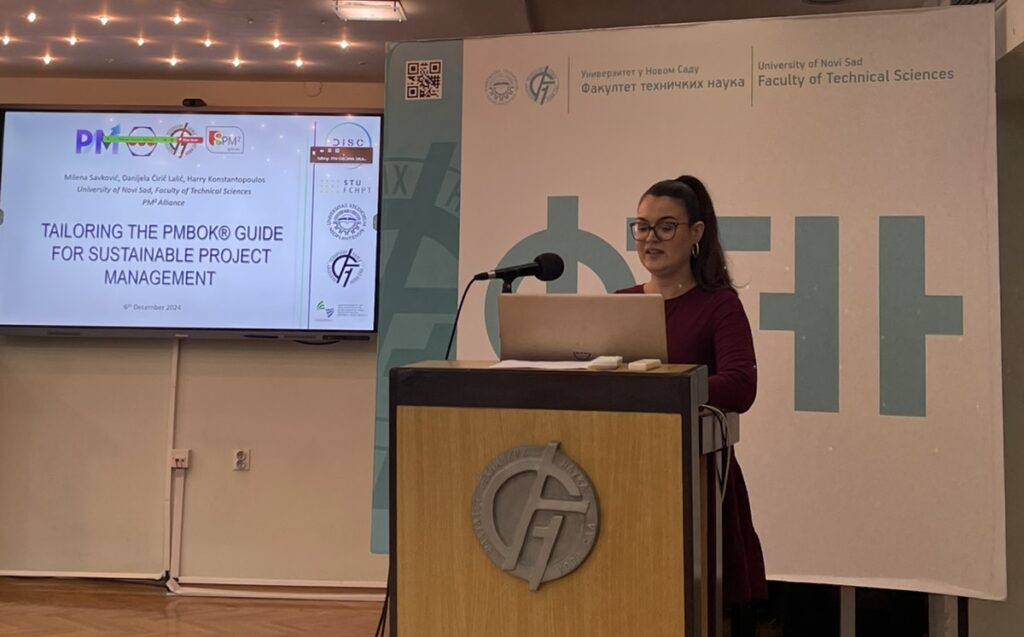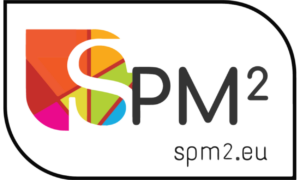
The 4th International Student Conference – DISC2024, held at the University of Novi Sad on December 5–6, 2024, gathered young researchers, students, and professionals from across Europe and Africa to share forward-looking research. Among the key messages emerging from the event: project management needs to evolve—and sustainability must be at its core.
A standout contribution came from the team behind the Sustainable Project Management through PM² (SPM²) Erasmus+ project, whose members presented a research paper titled “Tailoring the PMBOK® Guide for Sustainable Project Management.” The paper, co-authored by Milena Savković, Prof. Dr. Danijela Ćirić Lalić, and Haris Konstantopoulos, proposed concrete ways to adapt existing standards to embed sustainability across the project lifecycle.
Redesigning Standards for a Sustainable Era
While the PMBOK® Guide from the Project Management Institute (PMI) remains one of the most widely recognized project management standards globally, the research team emphasized that “traditional frameworks alone are no longer sufficient in today’s complex, sustainability-driven landscape.”
Their presentation proposed enhancements that align project planning and execution with long-term environmental and social goals—such as lifecycle thinking, stakeholder inclusiveness, and more adaptive approaches to governance and risk.
These ideas closely reflect the guiding philosophy of the SPM² project, which is currently developing a sustainability-adapted version of the European Commission’s PM² methodology.
Bridging the Gap Between Methodology and Mission
One of the most engaging aspects of the DISC2024 session was the interactive Q&A, where participants from Serbia, Poland, Portugal, Hungary, and Tanzania discussed how sustainability considerations can be more deeply embedded into real-life project work.
Although the paper itself focused on PMBOK®, the SPM² project was cited as a practical, policy-aligned example of how methodologies can be transformed in service of a greener and fairer future. This helped draw connections between academic inquiry and practical application—a central aim of the SPM² initiative.
“This event reaffirmed that young professionals are ready to lead change,” said Prof. Dr. Danijela Ćirić Lalić. “They don’t just want to manage projects; they want to shape systems.”
A New Generation of Project Leaders Emerges
Over 60 participants attended DISC2024, including many early-career professionals and graduate students with strong interests in sustainability, engineering, management, and policy. The conference program included sessions on:
- Environmental Protection and Sustainable Development
- Strategic Human Resource and Business Management
- Civil Engineering and Infrastructure
- Occupational Safety and Health
- Education 3.0
- Sustainable Project Management
The resonance between these themes and the goals of SPM² was unmistakable. In particular, the call for adapting and evolving project methodologies aligned strongly with the SPM² project’s focus on educational and institutional change.
From Research to Action: What’s Next?
As a follow-up to the presentation, the paper will be published in the DISC2024 conference proceedings, expanding its reach within the academic community. Meanwhile, the insights from the discussion continue to inform the broader SPM² mission to equip Europe’s project workforce with the competencies needed for sustainable transformation.

Download the SPM² Needs Analysis Report to explore the top skill gaps, learning needs, and system-level recommendations identified across 15 countries and over 900 practitioners.

